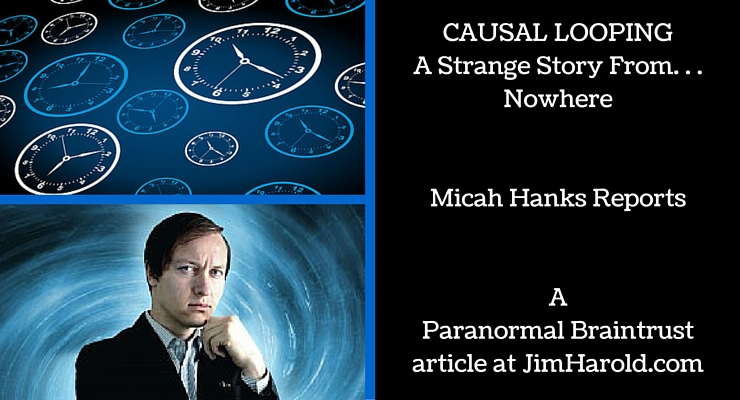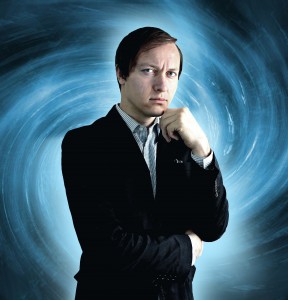

Micah Hanks
There is an old saying that goes, “there ain’t no such thing as a free lunch.”
The origin of the phrase actually entails what really were, in fact, free lunches that used to be provided in bars around the United States back in the old days. The stipulation had been that a patron who purchased at least one beverage would be offered food, although generally of a variety rich in salt, which only increased one’s thirstiness. In modern usage, the phrase is generally taken to have the underlying meaning that “you don’t get something for nothing,” and saw its greatest popularity following its use in Robert Heinlein’s libertarian science fiction masterpiece, The Moon is a Harsh Mistress.
On the subject of issues that arise from “getting something from nothing”, imagine the following scenario: a professor travels into the future and visits a library, where he discovers an innovative book on mathematics. He opens the book and begins skimming through the pages, and eventually finds an equation unlike any he had known to exist in the present day from which he arrived. The professor makes note of this equation, and brings knowledge of it back with him when he returns to his temporal point of origin.
Later, he meets a student for coffee, and tells of his marvelous trip to the future, along with his discovery of this futuristic new mathematical equation. The student is equally fascinated by it, and decides to write a paper detailing the equation, along with the theory behind. The paper is later published, and it appears in a journal… which turns out to be the very same which the professor had discovered in the library during his visit to the future.
There is a problem that arises from this story, however. When the professor learned about the equation by reading of it in a book, we must presume that it existed because of his own eventual actions which, in turn, had the effect of changing the course of events which actually led to the existence of the equation in the first place. Here’s the catch: neither the professor, nor his student, actually created the equation… each of them independently learned of its existence second hand. So where did the equation actually come from?
The problem this presents has to do with what is called a causal loop, a hypothetical time travel scenario in which a future event that occurs is actually the cause of a past event, which thus causes the future event to occur as well. Despite their existence together in spacetime, neither event has a definite, independent origin.
So why, exactly, is this a problem? According to thermodynamic laws, there are serious limitations on what can happen to information in our universe. Like energy, the premise is that it can neither be created, nor destroyed, although transitions may occur between its various states. If the paradox we’ve outlined above—sometimes referred to as “The Bootstrap Paradox”, in reference to a short story by (you guessed it!) Robert Heinlein—holds any water, then we must presume that the information in question came from nowhere, since neither the professor, nor the student, actually did the work that resulted in the formation of said equation. In other words, it simply manifested in spacetime, as if by magic, as a result of the influence (or blundering, perhaps) of our nutty time-traveling professor.
The situation I’ve outlined here bears similarity to what, until fairly recently, had been a long held (and famous) debate between physicists Stephen Hawking and Leonard Susskind, as outlined in the latter’s book The Black Hole War. In this book, Susskind argued against Hawking’s premise that information was lost once it entered a black hole, rather than being preserved in Hawking radiation. For information to be “lost” in this way would essentially constitute a violation of the conservation of information, an extrapolation upon the law of conservation of energy, which is fundamental to the mechanics of our universe (I will note, however, that Hawking eventually retracted this paradoxical view toward black holes and their appetite for information, accepting a position in agreement with Susskind).
So to be clear, information from nowhere is not the kind of thing that jives well with the laws of physics. Of course, in keeping with the known mechanics of the universe, I tend to agree on all the aforementioned points; although the discussion of causal loops and information paradoxes does remind me of a peculiar experience I had a number of years ago, which had been both serendipitous, as well as a bit baffling.
On the occasion in question, I had been visiting Joshua Warren, author and paranormal researcher, at his home along with a number of other guests. As memory serves, a handful of us were there in Joshua’s living room late one night, probably enjoying a glass of whiskey, as our host began sharing a strange story his family had told over the years. The story detailed the disappearance of Claude Calloway, an ancestor on Warren’s mother’s side of the family. Claude, probably in his late twenties at the time, had been sitting on the front porch talking through the open kitchen window with his father, when he suddenly vanished.
Claude’s father presumed at the time that Claude had simply wandered off someplace, but this would later prove to be the last time anyone recalled seeing Claude alive. The theories about Claude’s fate would range from foul play, to an attempt to leave town quietly due to a bad deal having gone down. Whatever the case, his disappearance seems to have remained a mystery.
The strangest part, however, was yet to come. Only a few days before Claude vanished, he had posed for a family picture, and in the photograph that was later developed, Claude’s face had somehow been obscured. The family had always maintained, rather superstitiously, that the picture had somehow managed to foretell of Claude’s disappearance in the days to follow.
As I sat nearby, overhearing Joshua telling this story, I was amazed, but not because of the incredible nature of the story itself. It was because my family had the exact same story.
In addition to recognizing the story, I similarly recalled that there were a number of Calloways that existed on my father’s side of the family, and hence, it seemed almost undeniable that I had indeed heard this same story before… which would likely mean that Joshua Warren and I were, in fact, distant cousins.
My father has long held an interest in genealogy, and so I went to him with the story, and soon put him in touch with Joshua’s mother, who helped fill in a number of details about various members of the family. Within a few days, my father had managed to fill in the gaps, and confirmed without question that Joshua and I were indeed fourth cousins, and that Claude Calloway had been a common ancestor.
As if this story couldn’t get any stranger, here’s where the real twist enters the picture. Upon the realization that I was correct in my belief that Joshua and I were related to the same line of the Calloway family in Western North Carolina, my father admitted that there had been one element to the story that still troubled him.
“Who did you say originally told you the story of Claude Calloway?” my father asked me. I told him that I had heard it from him, obviously, but this didn’t seem to be case. My father explained that not only had he been unaware of the story until I approached him with it, but that on our side of the family tree, there had been virtually no interaction with the Calloways on Joshua’s side. In other words, there had been no way that any of my immediate family members should have known the story about Claude Calloway’s disappearance.
[clickToTweet tweet=”Did Micah Hanks have his own brush with time travel?” quote=”Did Micah Hanks have his own brush with time travel?”]Moments like this can have the effect of challenging one’s own perception of things. Here, I certainly found myself having to question whether I had really recalled the story from my youth, or if I had merely convinced myself that I had. In psychology, the notion of hindsight bias entails that a person may perceive that they had known the outcome of a series of events, despite that outcome having been unpredictable (this is sometimes also called “creeping determinism”). I wondered if I had merely fooled myself into thinking that I had known Joshua’s story, and its outcome, when in fact it was completely alien to me. And yet, had this been the case, of equal concern would be the question of why this “alien” story had nonetheless managed to confirm precisely what I had thought that it would: that Joshua and I shared a common family story, because we had common ancestors who experienced it. The fact that the story correlated perfectly with common ancestry between us seemed to make the possibility of mis-remembrance increasingly doubtful. Then as now, it seems more likely to me that I had indeed been told the story by some family member of mine… but who could that have been?
Who knows, maybe one day in the distant future, we will finally achieve what, today, seems impossible: actual, physical time travel. Whenever that occurs, perhaps someone scanning the web will have read the odd tale I’ve related here, and will decide to have a go with it themselves. Maybe he or she will travel backwards in time, far enough, perhaps, to be able to find a more youthful version of yours truly.
Maybe they’ll approach the younger “me” of yesteryear, and they’ll share with the young lad a very unusual story about his distant cousin Claude, and how a photo predicted that he would vanish into thin air only days later.
It all sounds like it could be a story fit for the printed page, and in fact, maybe it is: as I’ve written it here, perhaps I’ve just planted the very seed of an idea that will one day make its way back around, and thus explain this strange tale of time travel, paradoxes, and the bizarre synchronism that makes life so interesting. Who knows.
__
Micah Hanks is a writer, podcaster, and researcher whose interests include history, science, current events, cultural studies, technology, business, philosophy, unexplained phenomena, and ways the future of humankind may be influenced by science and innovation in the coming decades. With his writing, he has covered topics that include controversial themes such as artificial intelligence, government surveillance, unconventional aviation technologies, and the broadening of human knowledge through the reach of the Internet. Micah lives in the heart of Appalachia near Asheville, North Carolina, where he makes a living as a writer and musician. You can find his podcasts at GralienReport.com and his books at Amazon.com
